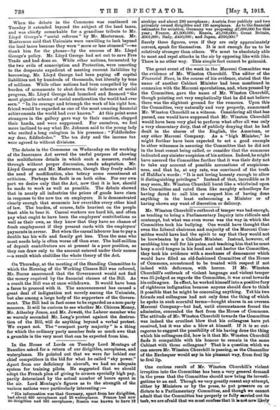The great event of the week in the Marconi Committee
was the evidence of Mr. Winston Churchill. The editor of the Financial News, in the course of his evidence, stated that the name of another Cabinet Minister had been mentioned in connexion with the Marconi speculations, and, when pressed by the Committee, gave the name of Mr. Winston Churchill, though pointing out very emphatically that he did not believe there was the slightest ground for the rumours. Upon this the Committee, very naturally and very properly, summoned Mr. Winston Churchill as a witness. Considering all that has passed, one would have supposed that Mr. Winston Churchill would have been very glad to perform what after all was only a very elementary duty, that of publicly denying that he had dealt in the shares of the English, the American, or any other Marconi Company. As a "high Minister," he might further have been expected to set a good example to other witnesses in assuring the Committee that he did not in the least resent being called, or consider that the summons indicated any sinister suspicion of his actions. Indeed, he might have assured the Committee further that it was their duty not to take any account of possible accusations of suspicious- ness, and that he, at any rate, was convinced of the truth of Halifax's words : "It is not loving honesty enough to allow it distinguishing privileges." Instead of that, incredible as it may seem, Mr. Winston Churchill burst like a whirlwind upon the Committee and rated them like naughty schoolboys for having dared to call him or suspect him of having done anything in the least unbecoming a Minister or of having shown any want of discretion or delicacy.


















































 Previous page
Previous page